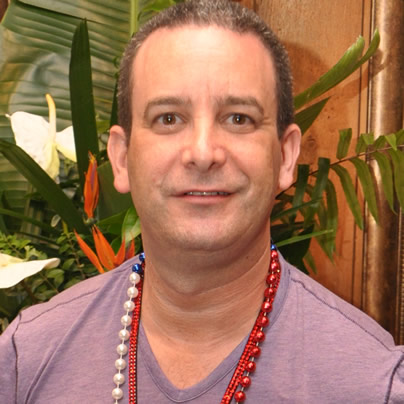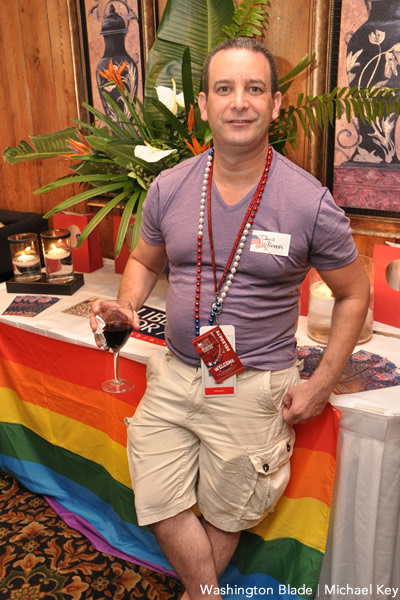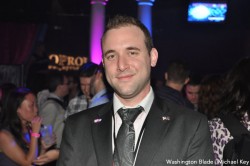National
RNC 2012: Economy the priority for gay GOP delegates
Gay delegates dismissive of marriage rights, party platform

TAMPA, Fla. — Gay delegates attending the Republican National Convention share a similar mindset when discussing their vision for the country: the economy is a priority, LGBT rights are not.
The Washington Blade spoke with a handful of out delegates who were committed to electing Republican presidential nominee Mitt Romney as they dismissed the notion that issues such as marriage equality and workplace non-discrimination protections had significant importance.
David Rappel, a gay 46-year-old travel agent from Los Angeles, said he wanted to represent his party on the national stage at this convention because he’s a conservative who has a long history as a Republican activist at the local and state level.
“I believe in the conservative message of lower taxes and of free trade, and people need to be independent of government,” Rappel said.
Asked whether he’s bothered by belonging to a party and supporting a presidential candidate that take a hard line against LGBT rights, Rappel invoked former President Ronald Reagan.
“I don’t agree with everything they say, but I agree with over 80 percent of what they say,” Rappel said. “Yes, we disagree on same-sex marriage, and some of my friends, we disagree on same-sex marriage, but that still does not preclude me from being a Republican.”
Rappel was similarly dismissive when asked about the anti-gay language in the Republican Party platform that strongly limits marriage to opposite-sex couples and endorses a Federal Marriage Amendment, calling the manifesto “worthless.”
“It doesn’t make a difference,” Rappel said. “No one reads a single word of the platform except for the press. There’s no one that’s ever run on any political platform.”
David Valkema, a gay 46-year-old business executive from Long Beach, Ind., similarly said he wanted to take part in the 2012 convention after participating in the 2004 and 2008 conventions.
“I see the new Republican Party that’s emerging in the last four years being united on issues that affect all of us — not just straight people, or religious people, but all Americans — gay, straight, white, black, Latino, Asian — and we are uniting as a party behind the core issues that really make us Republicans,” Valkema said. “I’m proud first-generation American, primarily. Secondarily, I’m a constitutional conservative who belongs to the Republican Party and I believe that change is only going to be effected by the two parties.”
The Long Beach, Ind., resident emphasized that being gay is only one part of him and he’s more concerned about the keeping the United States from adopting leftist policies than advancing LGBT rights.
“I don’t want to see it become any more socialist,” Valkema said. “You know what? I can redistribute my wealth much better than the government can, and I do. I give a lot away to charity. That’s not coerced wealth distribution.”
Valkema, who was pledged to Romney, touted being “a proud first-generation American” and said his parents were born and raised in the Netherlands, but immigrated to the United States after World War II after “they saw the storm clouds of socialism on the horizon.”
Asked whether he’s bothered by the anti-gay language in the Republican platform, Valkema replied he took part in drafting the Indiana state Republican platform, which makes no reference to marriage — even though that state is considering a constitutional amendment to ban marriage rights for gay couples.
“Now it’s OK, legally, for a Republican in Indiana, per the rules of the party, to feel however they want to feel about marriage, and I think you’re finding that across the board, state by state by state,” Valkema said. “And that’s where change happens in America — in the laboratory of the states.”
Additionally, Valkema professed a personal lack of interest in whether government recognition of same-sex unions is called marriage, civil unions, or some other name.
“You can call it marriage, you can call it partnerships, you can call it civil unions — for all I care you can call it jumping over the broomstick,” Valkema said. “What I care about are the equal rights inherent in a contractual union between a couple of the same sex. That’s all I care about.”
Pressed on whether he thinks civil unions are inherently inferior tom marriage, Valkema replied, “In your mind maybe, and if what you need is social acceptance, go somewhere else. Don’t go to the government for social acceptance, OK?”
It’s unclear how many openly LGBT delegates were in attendance at the convention in Tampa because the Republican National Committee doesn’t keep track of which of its delegates identify as LGBT. On the other hand, the Democrats do keep track and the Democratic National Committee works with states in setting goals for LGBT representation at the convention. Earlier this week, the National Stonewall Democrats announced Democrats would have a record 486 openly LGBT delegates at the convention as part of a group of 534 LGBT participants that include alternate delegates, standing committee members and pages.
Seth Kaufer, a gay 32-year-old physician and alternate delegate from Philadelphia, said his sexual orientation hasn’t been an issue — either in the process of becoming a delegate or in the treatment he’s received at the convention.
“There’s a lot of other things that describe me, and our party just doesn’t like to label people like that,” Kaufer said. “Democrats want to put everyone into a group, do identity politics, put up a specific ethnic candidate in a certain district. I see it all the time in Philadelphia. … You have a black district you have to put a black person [in]; you have a gay district, you have to put in a gay person there. That doesn’t even come into our thinking. You’re based on your merits, what you’ve done for the party.”
Kaufer also expressed confidence that limited measures such as domestic partnership would be able to pass even if Republicans controlled both the White House and Congress.
“Everyone talks about marriage, but there’s a lot of things we can agree on, but there’s things like non-discrimination in the workplace, partnership rights, financial equality,” Kaufer said. “I think that is the stuff we can all agree on and probably pass regardless of Republicans or Democrats are in control.”
But informed that Romney is opposed to any kind of relationship recognition for gay couples, Kaufer said he’s not a one-issue voter and “it’s selfish to look at one little thing when the economy is 100 percent — that affects everyone right now.”
“Those are all campaign issues,” Kaufer said. “But it was the same thing when Bush was president and the whole Congress was Republican. Not one thing was passed that was anti-gay.”
Despite Kaufer’s assertion that nothing anti-gay was passed under the Bush administration, Congress attempted to pass a Federal Marriage Amendment in 2004 and 2006, although the efforts failed the measure didn’t receive the supermajority of votes necessary for passage.
U.S. Supreme Court
Supreme Court to consider bans on trans athletes in school sports
27 states have passed laws limiting participation in athletics programs

The U.S. Supreme Court on Thursday agreed to hear two cases involving transgender youth challenging bans prohibiting them from participating in school sports.
In Little v. Hecox, plaintiffs represented by the ACLU, Legal Voice, and the law firm Cooley are challenging Idaho’s 2020 ban, which requires sex testing to adjudicate questions of an athlete’s eligibility.
The 9th U.S. Circuit Court of Appeals described the process in a 2023 decision halting the policy’s enforcement pending an outcome in the litigation. The “sex dispute verification process, whereby any individual can ‘dispute’ the sex of any female student athlete in the state of Idaho,” the court wrote, would “require her to undergo intrusive medical procedures to verify her sex, including gynecological exams.”
In West Virginia v. B.P.J., Lambda Legal, the ACLU, the ACLU of West Virginia, and Cooley are representing a trans middle school student challenging the Mountain State’s 2021 ban on trans athletes.
The plaintiff was participating in cross country when the law was passed, taking puberty blockers that would have significantly reduced the chances that she could have a physiological advantage over cisgender peers.
“Like any other educational program, school athletic programs should be accessible for everyone regardless of their sex or transgender status,” said Joshua Block, senior counsel for the ACLU’s LGBTQ and HIV Project. “Trans kids play sports for the same reasons their peers do — to learn perseverance, dedication, teamwork, and to simply have fun with their friends,” Block said.
He added, “Categorically excluding kids from school sports just because they are transgender will only make our schools less safe and more hurtful places for all youth. We believe the lower courts were right to block these discriminatory laws, and we will continue to defend the freedom of all kids to play.”
“Our client just wants to play sports with her friends and peers,” said Lambda Legal Senior Counsel Tara Borelli. “Everyone understands the value of participating in team athletics, for fitness, leadership, socialization, and myriad other benefits.”
Borelli continued, “The U.S. Court of Appeals for the Fourth Circuit last April issued a thoughtful and thorough ruling allowing B.P.J. to continue participating in track events. That well-reasoned decision should stand the test of time, and we stand ready to defend it.”
Shortly after taking control of both legislative chambers, Republican members of Congress tried — unsuccessfully — to pass a national ban like those now enforced in 27 states since 2020.
Federal Government
UPenn erases Lia Thomas’s records as part of settlement with White House
University agreed to ban trans women from women’s sports teams

In a settlement with the Trump-Vance administration announced on Tuesday, the University of Pennsylvania will ban transgender athletes from competing and erase swimming records set by transgender former student Lia Thomas.
The U.S. Department of Education’s Office for Civil Rights found the university in violation of Title IX, the federal rights law barring sex based discrimination in educational institutions, by “permitting males to compete in women’s intercollegiate athletics and to occupy women-only intimate facilities.”
The statement issued by University of Pennsylvania President J. Larry Jameson highlighted how the law’s interpretation was changed substantially under President Donald Trump’s second term.
“The Department of Education OCR investigated the participation of one transgender athlete on the women’s swimming team three years ago, during the 2021-2022 swim season,” he wrote. “At that time, Penn was in compliance with NCAA eligibility rules and Title IX as then interpreted.”
Jameson continued, “Penn has always followed — and continues to follow — Title IX and the applicable policy of the NCAA regarding transgender athletes. NCAA eligibility rules changed in February 2025 with Executive Orders 14168 and 14201 and Penn will continue to adhere to these new rules.”
Writing that “we acknowledge that some student-athletes were disadvantaged by these rules” in place while Thomas was allowed to compete, the university president added, “We recognize this and will apologize to those who experienced a competitive disadvantage or experienced anxiety because of the policies in effect at the time.”
“Today’s resolution agreement with UPenn is yet another example of the Trump effect in action,” Education Secretary Linda McMahon said in a statement. “Thanks to the leadership of President Trump, UPenn has agreed both to apologize for its past Title IX violations and to ensure that women’s sports are protected at the university for future generations of female athletes.”
Under former President Joe Biden, the department’s Office of Civil Rights sought to protect against anti-LGBTQ discrimination in education, bringing investigations and enforcement actions in cases where school officials might, for example, require trans students to use restrooms and facilities consistent with their birth sex or fail to respond to peer harassment over their gender identity.
Much of the legal reasoning behind the Biden-Harris administration’s positions extended from the 2020 U.S. Supreme Court case Bostock v. Clayton County, which found that sex-based discrimination includes that which is based on sexual orientation or gender identity under Title VII rules covering employment practices.
The Trump-Vance administration last week put the state of California on notice that its trans athlete policies were, or once were, in violation of Title IX, which comes amid the ongoing battle with Maine over the same issue.
New York
Two teens shot steps from Stonewall Inn after NYC Pride parade
One of the victims remains in critical condition

On Sunday night, following the annual NYC Pride March, two girls were shot in Sheridan Square, feet away from the historic Stonewall Inn.
According to an NYPD report, the two girls, aged 16 and 17, were shot around 10:15 p.m. as Pride festivities began to wind down. The 16-year-old was struck in the head and, according to police sources, is said to be in critical condition, while the 17-year-old was said to be in stable condition.
The Washington Blade confirmed with the NYPD the details from the police reports and learned no arrests had been made as of noon Monday.
The shooting took place in the Greenwich Village neighborhood of Manhattan, mere feet away from the most famous gay bar in the city — if not the world — the Stonewall Inn. Earlier that day, hundreds of thousands of people marched down Christopher Street to celebrate 55 years of LGBTQ people standing up for their rights.
In June 1969, after police raided the Stonewall Inn, members of the LGBTQ community pushed back, sparking what became known as the Stonewall riots. Over the course of two days, LGBTQ New Yorkers protested the discriminatory policing of queer spaces across the city and mobilized to speak out — and throw bottles if need be — at officers attempting to suppress their existence.
The following year, LGBTQ people returned to the Stonewall Inn and marched through the same streets where queer New Yorkers had been arrested, marking the first “Gay Pride March” in history and declaring that LGBTQ people were not going anywhere.
New York State Assemblywoman Deborah Glick, whose district includes Greenwich Village, took to social media to comment on the shooting.
“After decades of peaceful Pride celebrations — this year gun fire and two people shot near the Stonewall Inn is a reminder that gun violence is everywhere,” the lesbian lawmaker said on X. “Guns are a problem despite the NRA BS.”
-

 U.S. Supreme Court2 days ago
U.S. Supreme Court2 days agoSupreme Court to consider bans on trans athletes in school sports
-

 Out & About3 days ago
Out & About3 days agoCelebrate the Fourth of July the gay way!
-

 Virginia3 days ago
Virginia3 days agoVa. court allows conversion therapy despite law banning it
-

 Maryland5 days ago
Maryland5 days agoLGBTQ suicide prevention hotline option is going away. Here’s where else to go in Md.














